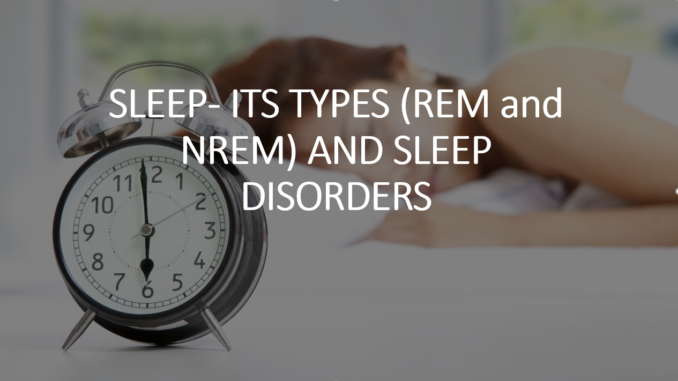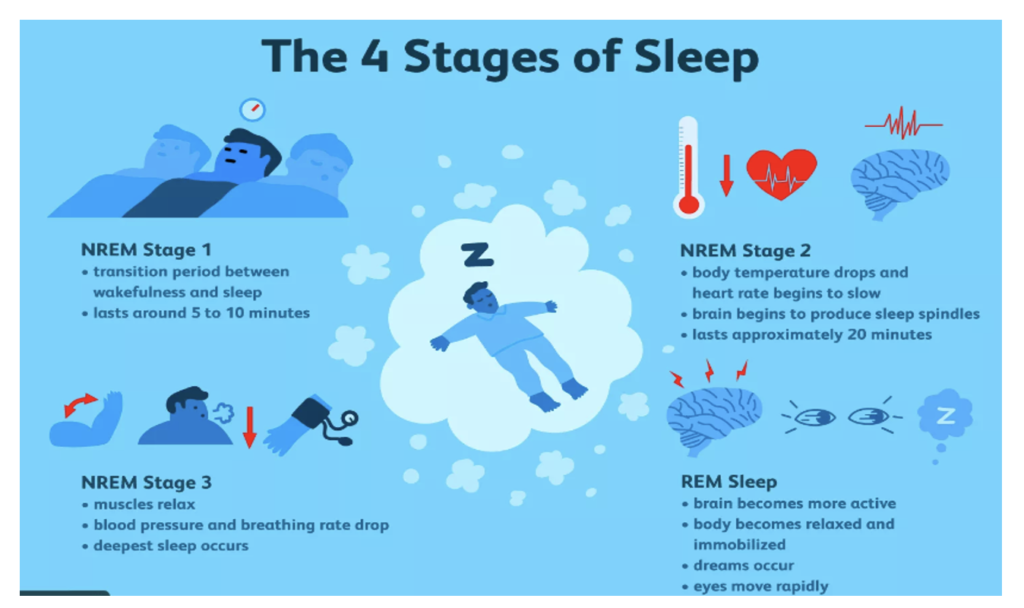
- All animals studied so far including mammals, birds, fish, insects, roundworms show characteristic signs of sleep. We all need sleep. Restoration of natural balance among the neuronal center in brain takes place mainly during sleep.
- For many people, sleep is absence of wakefulness where the responses towards environmental stimuli are reduced. But, in reality it is an active state characterized by behavioral, physiological and electrophysiological patterns. A lot of things are going on inside our head while we are in a slumber.
- Based on electrophysiological studies (EEG- Electroencephalogram, electromyogram, electro-oculogram), sleep has been classified into two types:
- NREM (Non- Rapid Eye Movement) Sleep or quiet sleep
- REM (Rapid Eye Movement) Sleep or active sleep or paradoxical sleep.
- NREM sleep was divided into four different stages before: stage 1,2,3 and 4. Recently, stages 3 and 4 are combined. While falling asleep, we pass through the stage 1,2 and 3 of NREM sleep. After stage 3 sleep, stage 2 is repeated before entering REM sleep of about 5-30 minutes. After REM sleep, stage 2 is repeated. This cycle repeats about 4-5 times during the night.
- We enter REM sleep approximately 90 minutes after falling asleep. The first cycle of REM sleep is short, but it becomes longer as cycle continues. NREM sleep constitute about 4-7 hours of sleep per night and REM sleep constitute about 90-120 minute
- NREM stages 1 and 2 constitute 50-60%, NREM stages 3 (slow wave) constitute 15 to 25% and REM sleep constitute 20-25% of total sleep in young adults. Slow wave sleep is prominent in children and decreases with the age.
Major Difference Between NREM and REM sleep


Sleep Disorders
- Sleep disorders are a group of conditions that affect the ability to sleep properly on a regular basis. Ability to go to sleep is a personal attribute and people are either ‘good sleepers’ or ‘bad sleepers.’ Sleep disorders are becoming increasingly common nowadays.
- Most people experience sleeping problems due to stress, hectic schedule and other influences. When these issues begin to occur on a regular basis and interfere with daily life, it indicates sleep disorders.
- There are numerous types of sleep disorders. Some of them are:
1) Insomnia
- Insomnia is the most common type of sleep disorder. It refers to the inability to fall asleep or to remain asleep. It can be caused by stress, anxiety, jet lag, digestive problems or hormones. It may be symptoms of some other medical conditions.
- Insomnia may be acute, chronic or intermittent. Acute insomnia lasts less than about 3 weeks and chronic insomnia may lasts for more than 3 week and needs detailed evaluation. Intermittent insomnia may occur periodically.
- Persistent insomnia is risky as it is associated with automobile accidents, depression, increased alcohol and may affect quality of life.
2) Parasomnias
- Class of sleep disorders that cause abnormal movements and behavior during sleep. It includes sleepwalking, sleep talking, nightmares, bedwetting and sleep paralysis.
3) Restless Leg Syndrome
- It is also called Willis-Ekbom disease which causes an uncomfortable sensation and an urge to move the legs during sleep. Its exact cause is not known.
4) Narcolepsy
- It is a condition characterized by extreme sleepiness during the day and falling asleep suddenly during the day. Person may feel extremely tired and fall asleep without warning. It may be associated with some neurological disorders like multiple sclerosis.
5) Sleep related breathing disorders
- Sleep apnea is a major example. Sleep apnea is characterized by pause in breathing during sleep.
- During this, throat muscles which holds the airway open during sleep fails to do so leading to collapse of airway. They may occur hundred of times in the night and also be the cause of waking up at night.
References
- https://www.verywellhealth.com/the-four-stages-of-sleep-2795920
- https://www.medicalnewstoday.com/articles/247927#alcohol-and-rem-sleep
- https://www.healthline.com/health/sleep/disorders#diagnosis
- https://www.mayoclinic.org/diseases-conditions/sleep-disorders/symptoms-causes/syc-20354018
- Born J, Diekelmann S. The memory function of sleep. Nature Reviews Neuroscience. 2-10; 11: 114-126.
- Rothschild AE, Appelbaum A, Lecea L. Neuronal Mechanisms for Sleep/Wake Regulation and Modulatory Drive. Neuropsychopharmacology. 2018; 43: 937-952.
- Pharmacology and Pharmacotherapeutics 24th edition.